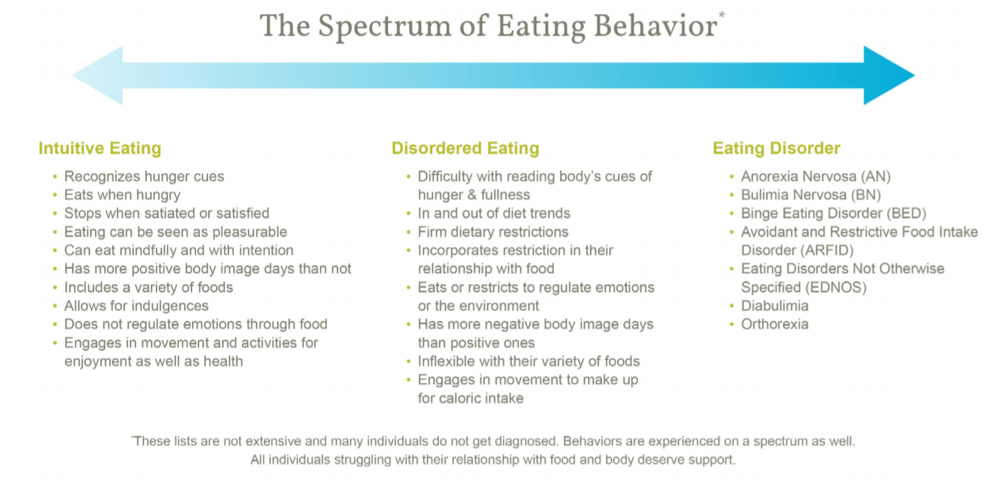
Body Image
Our relationship with food and our bodies are influenced by intersecting factors such as our own genetics, biology, thoughts, beliefs, and behaviors. In addition, our body image and relationship with food is impacted by external factors such as our family, culture, gendered expectations, media representations, our environment (i.e., walkable streets), and our socio-economic position (i.e., access to healthy food).
Our body image often is made up of how we view our bodies, how we talk about our bodies to others, and how we perceive others view our bodies. Our bodies change over time and so does our relationship with them. Becoming comfortable in our bodies and honoring them is a journey. This journey can be especially complex for transgender folks who may not identify with their body.
A healthy body looks different for everyone. A healthy body image is not determined by what we weigh or how many hours we spend at the gym. Part of having a healthy body is how we view our body and take care of it.
- Reflecting on and critically questioning the messages you receive about how the body should look or what it should be capable of doing. Question messages in the media as well as those from diet culture, i.e., the harmful normalizing of diets and calorie restriction, fat shaming, or conflating weight with health.
- Be aware of and try to reduce body checking behaviors. Do you check how much you weigh? Do you check yourself in the mirror to make sure certain your body looks a certain way? Or do you analyze how your clothes fit as a proxy for weight? Checking behaviors perpetuate dissatisfaction and worry about our bodies.
- Try thanking your body for all that it does for you! Recognizing all the amazing things our bodies do for us every day can promote a positive relationship with them.
- Listen to your body. Try movement that you enjoy rather than exercising in ways that don’t feel rejuvenating. Listen to you bodies’ cravings and hunger cues. This is called “intuitive eating.”
Eating Disorders
Anyone can be affected by an eating disorder and you cannot tell someone has an eating disorder by looking at them. Eating disorders are characterized by extreme thoughts, feelings, and behaviors around food and body image. People’s relationship with food and their body often exists on a spectrum. All people who are struggling with their relationship with food and their body deserve support. Getting help early is key to having a healthy relationship with eating.
There are a number of warning signs and symptoms that you or someone you know may be struggling with an eating disorderThose include:
- Ridged, obsessive, or ritualized thoughts or behaviors around eating
- A preoccupation with food, weight, and meals that takes a significant amount of mental energy/time
- Difficulty regulating emotions
- Withdrawal from friends or activities
- Checking your body for changes or perceived flaws
- Changes in eating habits (i.e., restricting food, binging food, having “safe” foods, or cutting out entire food groups)
- Having a negative body image
There are many different types of eating disorders that have different symptoms that can take a physical and mental toll on people in variety of ways.
Disordered eating in any form is serious and requires evaluation from a professional. Contacting CAPS is a great place to start. If you are concerned that a friend might have an eating disorder, discussing your concerns with them can be a first step. When discussing your concerns, give examples of specific behaviors you have noticed that concerned you. Your role is to listen, be patient, and let them know that help is available through CAPS or other resources.
Eating Disorders and Gender: 4 Stereotypes That Need to Go (healthline.com)
Health At Every Size Community Resources – HAES Community Resources
The Daily Realities of Being Fat, Black, and Queer in Public Spaces | them.
Warning signs and symptoms of an eating disorder https://www.youtube.com/watch?v=nJMtReAg1DI
https://www.nationaleatingdisorders.org/warning-signs-and-symptoms
https://www.nationaleatingdisorders.org/where-do-i-start-0
https://lindobacon.com/_resources/resources-organized-topic/
https://www.nimh.nih.gov/health/publications/eating-disorders/index.shtml
https://pha.berkeley.edu/2017/04/04/body-image-and-social-media-the-college-perspective/
https://uhs.umich.edu/bodyimage
https://wellness.uchicago.edu/healthy-living/health-information/body-image-and-eating-concerns/
https://www.uvm.edu/health/body-image-and-body-liberation
https://www.uvm.edu/health/body-image-and-eating-disorder-support
Contact and Hours of Operation
Address: 1462 Clifton Road, Suite 235, Atlanta, GA 30322
Phone: 404-727-7450
Fax: 404-727-2906
Crisis Consultation: Call 404-727-7450
Hours of Operation: 8:30-5:00, Monday-Friday
PLEASE NOTE: If Emory University is closed due to weather or other emergency, then CAPS is also closed. In such circumstances, students will be contacted to reschedule appointments once the university reopens.
